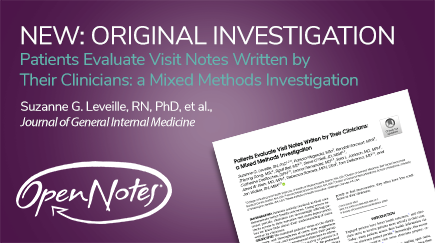
Journal of General Internal Medicine: Most patients understand visit notes, many have ideas for making notes more meaningful for patients
Boston, MA – In a new multisite study of patients who have experience reading clinician’s office visit notes (“open notes”), 96% reported understanding all or nearly all of the note, many of whom have suggestions for making documentation more meaningful to patient readers. The study of more than 20,000 patients found people overwhelmingly report understanding their notes and find them accurate, with few disparities according to sociodemographic or health characteristics of patients. The full article, Patients Evaluate Visit Notes Written by Their Clinicians: a Mixed Methods Investigation, was published in the Journal of General Internal Medicine(JGIM).
Of 21,664 survey respondents, 96% (20,813) reported understanding all or nearly all of their notes, with few differences by clinician type or specialty. Overall, 93% (20,218) agreed or somewhat agreed that the note accurately described the visit; however, 6% (1,251) reported “something important missing” from the note. Among the 4% (851) of patients who reported understanding some or little of the note, most looked for help: 35% searched the Internet, 27% asked a clinician, and 7% asked a friend or family member. Surveys were sent to patients who read at least one note over a 12-month period.
“Clinicians who worry about being inundated by questions from patients should find the results of this study encouraging,” said Suzanne Leveille, RN, PhD, lead author of the study and Professor of Nursing in the College of Nursing and Health Sciences at the University of Massachusetts. “We wanted to understand patients’ experiences in reading their notes, and it turns out nearly all patients said they understood the notes, and many offered helpful ideas that would make them more meaningful for patients.”
When asked for ways in which notes might be made more meaningful, patients suggested:
- Restructuring notes to put the most important information at the top
- Avoiding medical jargon, and/or including “mouse over” features in the online patient portal to define terms and acronyms
- Avoiding potentially judgmental language, such as “patient denies” or “obese”
When patients agreed that a note accurately represented a visit, 96% would recommend the authoring clinician to family/friends. However, only 43% of patients would recommend the clinician if they felt the note described the visit inaccurately.
Researchers surveyed adult outpatients about reading their clinicians’ visit notes through online portals affiliated with 3 U.S. health systems: Beth Israel Deaconess Medical Center (BIDMC) in Boston, Geisinger health system in Pennsylvania, and University of Washington Medicine (UW) in Seattle.
FUNDING
This work was supported by grants from the Robert Wood Johnson Foundation, Gordon and Betty Moore Foundation, Peterson Center on Healthcare, and Cambia Health Foundation.
CO-AUTHORS
Patricia S. Fitzgerald, MSc, Kendall Harcourt, MPA, and Zhiyong Dong, MSc at Beth Israel Deaconess Medical Center; Sigall Bell, MD, Steve O’Neill, JD, MSW, Catherine DesRoches, DrPH, Leonor Fernandez, MD, Tom Delbanco, MD, and Jan Walker, RN, MBA at Harvard Medical School and Beth Israel Deaconess Medical Center; Sara L. Jackson, MD, MPH, and Jared W. Klein, MD, MPH, at the Division of General Internal Medicine, School of Medicine, University of Washington; and Rebecca A. Stametz, DEd, MPH, at Steele Institute for Health Innovation, Geisinger.
###
About OpenNotes
OpenNotes, based at the Beth Israel Deaconess Medical Center in Boston, a major Harvard Medical School teaching hospital, studies the effects of shared clinical notes on patients, care partners and clinicians, and disseminates its findings. OpenNotes works with collaborators around the country and overseas to foster and evaluate the spread and implementation of shared clinical notes (“open notes”). OpenNotes does not develop software and is not a technology company. It is funded entirely by federal and philanthropic grants and gifts. To learn more, visit www.opennotes.org.
About Beth Israel Deaconess Medical Center
Beth Israel Deaconess Medical Center is a patient care, teaching and research affiliate of Harvard Medical School and consistently ranks as a national leader among independent hospitals in National Institutes of Health funding.
BIDMC is in the community with Beth Israel Deaconess Hospital-Milton, Beth Israel Deaconess Hospital-Needham, Beth Israel Deaconess Hospital-Plymouth, Anna Jaques Hospital, Cambridge Health Alliance, Lawrence General Hospital, Signature Healthcare, Beth Israel Deaconess HealthCare, Community Care Alliance and Atrius Health. BIDMC is also clinically affiliated with the Joslin Diabetes Center and Hebrew Rehabilitation Center and is a research partner of Dana-Farber/Harvard Cancer Center and the Jackson Laboratory. BIDMC is the official hospital of the Boston Red Sox. For more information, visit www.bidmc.org.
BIDMC is part of Beth Israel Lahey Health, a new health care system that brings together academic medical centers and teaching hospitals, community and specialty hospitals, more than 4,000 physicians and 35,000 employees in a shared mission to expand access to great care and advance the science and practice of medicine through groundbreaking research and education.



